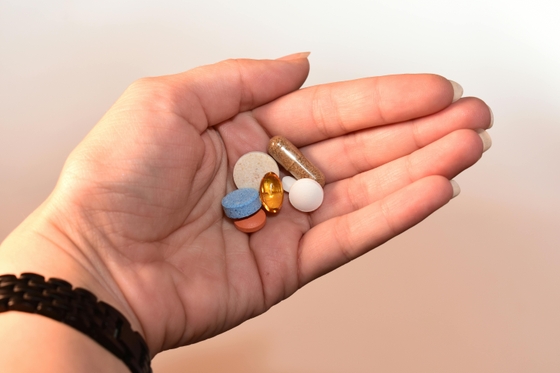
Heart medicines – Frequently asked questions
On this page, you’ll find answers to common questions like:
8 min read
- how do I take my heart medicines?
- do my heart medicines have any side effects?
- how long do I need to take my heart medicines for?
- how can I reduce the cost of my medicines?
Heart medicines: side effects, duration, and cost-saving tips
If you take a heart medicine, you may have a few questions. It’s important you understand your medicines, what they’re for, and how to take them correctly. If you’ve had a heart attack or have a heart condition, your healthcare team may have started you on different medicines before leaving hospital. You will need to keep taking these when you go home.
Your GP or pharmacist can answer specific questions about your heart medicines. You can also call the free Medicines Line (1300 MEDICINE or 1300 633 424).
Frequently asked questions about heart medication
Find answers to common questions about heart medicines.
Why is it important to take my heart medicines?
It is important to take your heart medicines to:
• reduce your risk of future heart problems
• manage your symptoms
• improve your quality of life
• help keep you out of hospital
• help you live longer.
Depending on your heart condition, you might need to take more than one type of medicine.
How do I take my heart medicines?
Your GP or pharmacist will give you information about how and when to take your heart medicines. Each medicine should also come with a consumer medicines information leaflet. Ask your pharmacist if it is not there. You can also find information about your medicines by searching on the Australian Register of Therapeutic Goods.
Heart medicines come in different forms. These include tablets, capsules, sprays or patches. Tablets and capsules are taken by swallowing with water. Sprays and patches may be applied to your skin, and some sprays may be taken by mouth. Exactly how it needs to be taken depends on the medicine.
Some medicines for heart conditions need to be taken regularly (for example, blood pressure medicines). For others, you might only need them when you have symptoms (for example, mouth spray for angina (chest pain)). You should always keep these types of medicines with you in case you get symptoms. Remember to check the expiry date if you don’t use these medicines often.
How long do I need to take my heart medicines for?
You might only need to take some heart medicines for a short time, for example after having a heart procedure like a stent insertion. Or, if it is for a condition you live with, you might need to take heart medicines for your whole life. Your heart medicines may change over time including the type of medicine and the dose.
It’s important to know when you started each heart medicine and how long you need to take it for. You can write down the date or month you started each medicine.
Once you’re feeling better, you might start to think you don’t need your heart medicines anymore. It’s important to continue taking them though, as they help keep you well. Taking your medicine can reduce the risk of a future heart attack and other problems down the track.
If you want to stop taking a medicine or change the dose, it’s important to speak with your GP first.
How do I keep track of my heart medicines?
It is important to keep track of what heart medicines you are taking for many reasons:
- To remind you of when and how to take your medicines.
- To help you understand what your medicines are for and why they are important.
- To ensure everyone involved in your health care knows what medicines you are taking.
- To help your GP and pharmacist review and check your medicines.
- To provide important information about your medicines in an emergency.
Keep a list of the medicines you take, for example on a piece of paper in your wallet or on your phone. There are also free apps you can download on your phone, like MedicineWise: Manage Medicine.
For each medicine, it’s helpful to make a note of:
- the name of the active ingredient and the brand name
- the strength and dose
- when and how often to take the medicine
- how to take the medicine (for example, with food)
- what the medicine is for (for example, for blood pressure or an abnormal heart rhythm)
- the type of medicine (prescription or over-the-counter)
- what to do if you miss a dose.
Do my heart medicines have any side effects?
Side effects (also called adverse effects) are the unwanted effects of a medicine. All medicines have possible side effects but not everyone will experience them. When your GP prescribes a medicine, it is important to ask about possible side effects. This is so you can weigh up the benefits and potential risks of taking the medicine.
Some questions you might like to ask:
- What are the possible side effects?
- How common are the side effects?
- Are there any serious side effects, and how likely are these?
- Is there anything I can do to avoid or reduce side effects?
- What should I do if I get a side effect?
- Will the side effect improve or disappear with time?
Side effects will also be listed on the consumer medicines information leaflet that comes with your medicine. This list can be long but remember most people won’t get any side effects. Or if they do, they will be minor.
If you experience any side effects, let your GP or pharmacist know as soon as possible.
Can I take over-the-counter medicines?
Over-the-counter medicines are medicines you can buy from a pharmacy, supermarket or health food shop without a prescription. Over-the-counter medicines include some pain medicines, cold and flu medicines, supplements and vitamins.
People often think over-the-counter medicines are safe because you do not need a prescription. But for people with heart conditions, some over-the-counter medicines can interact with your heart medicines and cause serious side effects.
If you have a heart condition or take heart medicines, it is important you get advice from your GP or pharmacist before using any over-the-counter medicines.
Some common over-the-counter medicines that can interact with heart medicines are:
- Anti-inflammatory medicines – these are often used to treat muscle aches and pains. They are also known as ‘non-steroidal anti-inflammatory drugs’ or ‘NSAIDs’. There are several NSAIDs available in Australia. If you have a heart condition, including heart failure, it is recommended you avoid using NSAIDs. This is because NSAIDS can make your body hold onto water and salt, causing blood pressure to rise and your heart must work harder to pump blood. NSAIDs can also make it harder for your heart failure medicines to work properly. Speak to your GP or pharmacist for more information.
- Aspirin is also a type of anti-inflammatory medicine that is available over the counter. A GP might prescribe aspirin to prevent a heart attack in someone who has already had a heart attack. If you are taking any heart medicines, don’t take aspirin unless your GP or pharmacist has told you to.
- Vitamins and supplements are taken for a variety of reasons. There is no strong evidence that you can reduce the risk of heart problems or get any heart benefits from vitamins or herbal and mineral supplements, including those used in traditional Chinese medicine, Ayurvedic (traditional Indian) medicine, homeopathy and naturopathy. There is some evidence that omega-3 fatty acids might help reduce the risk of coronary heart disease by reducing the level of some types of fat in the blood (triglycerides). But you shouldn’t take vitamins or supplements to help prevent heart problems unless prescribed by your GP.
- Medicines high in salt, including dissolvable tablets and powders, vitamins, and antacids. Too much salt can increase the risk of high blood pressure, which is a risk factor for cardiovascular disease. For people with a heart condition, high blood pressure can make your condition worse.
- Decongestants, which are found in cough and cold medicines can make your heart work harder and can stop some medicines from working properly. Some liquid cough and cold medicines also contain alcohol, so aren’t suitable for people with atrial fibrillation or heart failure.
If you are taking any over-the-counter medicines, including vitamins or supplements, let your GP know. They need to make sure these medicines aren’t causing you harm by interacting with your current heart medicines.
Are there foods or drinks that can interact with my heart medicines?
There are some foods and drinks that can interact with heart medicines. Your GP or pharmacist will let you know if there are any foods or drinks you should avoid.
A common example is grapefruit and grapefruit juice. Grapefruit can cause more of some medicines to be taken up by the body. This means there is more of the medicine in your blood, which can cause side effects or change how the medicine works.
Heart medicines that interact with grapefruit and grapefruit juice include:
- statins, which are medicines to lower cholesterol
- some medicines for high blood pressure
- medicines for abnormal heart rhythms.
Another example is foods that are high in vitamin K, which can affect how warfarin works. These foods include green leafy vegetables, chickpeas, avocado and olive oil. You don’t need to stop eating these foods, but eating similar amounts of them day-to-day means the dose of warfarin you need to take is more likely to stay the same.
Speak to your GP or pharmacist for more information about foods and drinks that may interact with your heart medicines. Don’t stop taking your medicine without speaking to your GP first.
Why does my heart medicine have different names?
Most medicines have two names:
- Active ingredient name (the chemical in the medicine that makes it work). This is also sometimes called the generic name.
- Brand name (the name the manufacturer gives the medicine).
Some medicines have more than one active ingredient but will only have one brand name.
It is helpful to know the active ingredient of your medicines because you can:
- recognise when two different brands are the same medicine
- check you’re not taking a medicine you’re allergic to
- recognise when you shouldn’t be taking it with another medicine
- identify alternatives to your usual medicines when travelling overseas
- avoid accidentally double dosing with two medicines that are the same.
Before you leave hospital or your GP’s clinic, make sure you have a list of the brand name and active ingredient name for each medicine you need to take.
Can I use cheaper (generic brands) of medicines?
When you have a prescription filled at a pharmacy, your pharmacist may ask you if you’d like to buy the cheaper (or generic) brand of a medicine.
Generic medicines are as effective and safe as the brand name medicines. This is because they contain the same chemical (active ingredient). It is important to remember a few things:
- Your GP may want you to take a certain brand of medicine. If this is the case, they will tick the “Brand substitution not permitted” box on your prescription.
- Some medicines have many different generic brands. Each generic brand may have different packaging and the medicines can appear quite different. This includes the shape, colour, smell and taste.
- Some people prefer to stick to their brand name medicine to avoid confusion, especially if they take a lot of medicines.
- If you have allergies, you should ask your GP or pharmacist before switching to a generic medicine. This is because it can contain other ingredients you might be allergic to.
If you are spending a lot of money on medicines, the government schemes such as the Pharmaceutical Benefits Scheme Safety Net, or concession cards may be able to help you.
What if I have trouble taking my medicines?
There are a range of reasons why some people may find it difficult to take their medicines. They might have difficulty swallowing tablets. Or some people find it hard to open the medicine packaging. If you are having trouble taking your medicines, it’s best to speak to your GP or pharmacist as soon as possible. They can help you find a solution.
Remember:
- Don’t crush or break tablets to make them easier to swallow (unless your GP or pharmacist has told you to do this).
- Don’t open capsules and mix the medicine inside with water. This can affect how well the medicine works.
- Don’t stop taking your medicine or change the dose, even if you feel well.
- If you find it hard to read the information on your medicines packaging, you can ask your pharmacist to print a label with large text.
How can I remember to take my medicines?
It is not uncommon for people to forget to take their medicine from time to time, especially if it’s a new medicine.
Below are some top tips for remembering when to take your medicine.
- Make it part of your daily routine. You can remind yourself to take your medicine by linking it with things you do every day. For example, you can take your morning medicines before getting in the shower or with your breakfast. Or you can take your evening medicines just before you brush your teeth.
- Set a daily alarm or reminder. You can set up your phone, alarm clock or computer to remind you when to take your medicine at certain times of the day. The MedicineWise: Manage Medicine app allows you to set reminders for when to take your medicine.
- Use a chart or calendar. Keep the calendar in a part of the house you use often. Mark off when you have taken your medicines for that day.
- Ask your GP if there are other ways to help you remember to take your medicines. For example, some medicines can be combined into one tablet. Or your GP might be able to reduce the number of doses you need to take in a day. You can also speak to your pharmacist to see if there are ways your medicines can be packaged to remind you when to take them, such as in a blister pack or dose sachets.
- Ask your GP or pharmacist about getting a Home Medicines Review. This is when your pharmacist checks the medicines you are taking. They can make sure you are receiving the right medicines and that you are taking them correctly.
How can I access my medicines easily and safely?
Ask your GP about electronic prescribing (e-prescribing). Instead of a paper prescription, they can send you your prescription to your phone (by SMS) or email. You can then send the SMS or email to a pharmacy. Depending on the pharmacy, they may be able to deliver your medicine to you. Or you can send the SMS or email to a family member or carer, and they can get your medicine for you.
Don’t ever buy your medicines online unless it’s from a well-known Australian pharmacy. That way you can be sure that you are getting the right medicines and they will act as they should.
What do I do if I miss a dose of my heart medicine?
Sometimes you might accidentally miss a dose of your regular medicines. Unless told otherwise by your GP or pharmacist, if you miss a dose of your medicine, take your next usual dose at the normal time. Never double dose. When you next see your GP let them know you missed a dose as it may affect health tests or monitoring. If you find you often miss doses, discuss this with your pharmacist or GP. They can help you find ways to remember to take your medicines.
How do I store my medicines?
Most medicines need to be stored in a cool, dry place. Dampness, sunlight and heat can damage medicines, meaning they might not work as well. For example, avoid leaving them in the bathroom, car or in direct sunlight on a windowsill. Occasionally a medicine may need to be stored differently – such as in the fridge. The information leaflet with the medicine will say how it should be stored.
Always keep your medicine out of sight and reach of children and pets.
Where possible, keep your medicine in its original packaging. This will protect it and can help you keep track of how much you’ve taken.
For more information about storing your medicines, you can:
- ask your pharmacist
- read the information on the medicine’s packaging
- read the consumer medicines information leaflet that comes with your medicine.
There are safe ways to dispose of unused medicines without harming others or the environment. Contact your local pharmacy for more information about returning unwanted medicines.
Can I drive while taking my medicines?
Most heart medicines won’t stop you from driving, but it’s best to ask your GP or pharmacist if you can drive when you start a new medicine.
Medicines given during or after heart procedures may make you drowsy, so you won’t be safe to drive. Your GP will tell you when it’s safe to drive again.
Can I travel with my medicines?
With a bit of planning, you can travel with your medicines. Here are a few things to keep in mind:
- Ask your GP or pharmacist for a list of your current medicines and medical conditions. Make sure the list includes all the names written on the bottle or the packet. Having a current medicines list is important because you may be asked for it at customs or airport security. Or you may need medical care while you’re away, and the healthcare professional will want to know what medicines you are currently taking. It doesn’t have to be a paper list – you can also record the list on a free app like MedicineWise: Manage Medicine. Make sure you keep all your medicines in their original packaging with your name on the label.
- If you’re travelling by plane, keep your medicines with you in your hand luggage. This is a good idea for many reasons. Your other luggage may get lost, or you may need to take your medicine during a flight. Some medicines also need to be kept in the fridge, which you can ask the flight crew to store for you. If travelling through different time zones, speak to your GP about when to take your medicines.
- Make sure your medicines are stored at the right temperature. Keeping medicines at the right temperature is important to make sure they work properly. If you’re travelling in the heat, you may need to keep your medicines in cooler bags. Speak to your GP or pharmacist for more information.
Read more about travelling with your medicines.
Where can I find reliable information about my medicines?
Your GP or pharmacist can answer any questions you have about your heart medicines.
Other reliable sources of information include:
- Consumer medicines information leaflets – these come with most medicines and explain what the medicine is for, how to take it, and if there are any side effects. If you didn’t receive this, ask your GP or pharmacist for a copy. You can also look a leaflet up on the Australian Register of Therapeutic Goods.
- Home Medicines Review – involves your pharmacist checking the medicines you are taking at home. They can make sure you are taking the right medicines in the right way. A Home Medicines Review might be helpful if you:
- are taking more than five medicines a day
- have recently been in hospital
- are confused or worried about your medicines
- are having trouble remembering to take your medicines.
Medicines Line (1300 MEDICINE or 1300 633 424) – this is a free telephone service where pharmacists answer your questions about prescription and over-the-counter medicines
References
- Brieger D, Cullen L, Briffa T, et al. National Heart Foundation of Australia & Cardiac Society of Australia and New Zealand: Australian clinical guideline for diagnosing and managing acute coronary syndromes 2024. Heart, Lung & Circulation. In press.
- Aronson JK, ed. Meyler’s side effects of cardiovascular drugs. Elsevier, 2009.
- NPS MedicineWise. Information for consumers and carers. 2022. Accessed 28 January 2025. www.nps.org.au/consumers
- Healthdirect. Medicines information. nd. Accessed 28 January 2025. www.healthdirect.gov.au/medicines
- Arfè A, Scotti L, Varas-Lorenzo C, et al. Non-steroidal anti-inflammatory drugs and risk of heart failure in four European countries: nested case-control study. BMJ. 2016;354:i4857. doi:10.1136/bmj.i4857
- Kim J, Choi J, Kwon SY, et al. Association of multivitamin and mineral supplementation and risk of cardiovascular disease. Circ Cardiovasc Qual Outcomes. 2018;11(7):e004224. doi:10.1161/CIRCOUTCOMES.117.004224
- Al‐Khudairy L, Flowers N, Wheelhouse R, et al. Vitamin C supplementation for the primary prevention of cardiovascular disease. Cochrane Database Syst Rev. 2017;(3). doi:10.1002/14651858.CD011114.pub2
- Liperoti R, Vetrano DL, Bernabei R, Onder G. Herbal medications in cardiovascular medicine. J Am Coll Cardiol. 2017;69(9):1188-1199. doi:10.1016/j.jacc.2016.11.078
- Jenkins DJA, Spence JD, Giovannucci EL, et al. Supplemental vitamins and minerals for CVD prevention and treatment. J Am Coll Cardiol. 2018;71(22):2570-2584. doi:10.1016/j.jacc.2018.04.020
- Abdelhamid AS, Brown TJ, Brainard JS, et al. Omega‐3 fatty acids for the primary and secondary prevention of cardiovascular disease. Cochrane Database Syst Rev. 2020;(3). doi:10.1002/14651858.CD003177.pub5
- Cross AJ, Elliott RA, Petrie K, Kuruvilla L, George J. Interventions for improving medication‐taking ability and adherence in older adults prescribed multiple medications. Cochrane Database Syst Rev. 2020;(5). doi:10.1002/14651858.CD012419.pub2
You might also be interested in...

Taking your heart medicines
Learn why heart medicines matter, how they help, and key tips for taking them safely. Stay heart-healthy with expert advice.

Understanding your heart medicines
Find out about common heart medicines

What is an INR test? Do I need to have them?
Learn about INR tests, their purpose, and the normal range for individuals on medications like warfarin to manage blood clotting risks.
Last updated14 October 2025
Last reviewed29 April 2025
